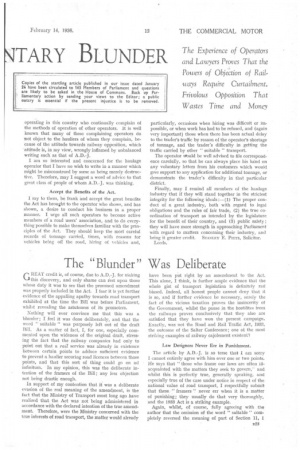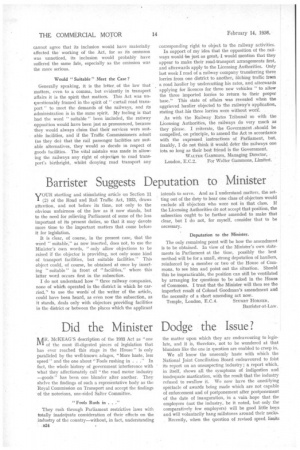The "Blunder" Was Deliberate
Page 33

Page 34

If you've noticed an error in this article please click here to report it so we can fix it.
GREAT credit is, of course, due to A.D.-J. for niaking this discovery, and only shame can rest upon those whose duty it was to see that the promised amendment was properly included in the Act. I fear it is yet further evidence of the appalling apathy towards road transport exhibited at the time the Bill was before Parliament, whilst revealing the astuteness of its promoters.
Nothing will ever convince me that this was a blunder ; I feel it was done deliberately, and that the word " suitable " was purposely left out of the draft Bill. As a matter of fact, I, for one, especially commented upon the wideness of the original draft, stressing the fact that the railway companies had only to point out that a rail service was already in existence between certain points to adduce sufficient evidence to prevent a haulier securing road licences between those points, and that this sort of thing could go on ad infinitum. In my opinion, this was the deliberate intention of the framers of the Bill ; any less objection not being drastic enough.
In support of my contention that it was a deliberate evasion of the real meaning of the amendment, is the fact that the Ministry of Transport must long ago have realized that the Act was not being administered in accordance with the declared intention of the true amendment. Therefore, were the Ministry concerned with the true interests of road transport, the matter would already
have been put right by an' amendment to the Act. This alone, I think, is further ample evidence that the whole gist of transport legislation is definitely rail biased. Indeed, all honest people cannot deny that it is so, and if further evidence be necessary, surely the fact of the vicious taxation proves the insincerity ot the Government, whilst the pause in the hostilites from the railways proves conclusively that they also are satisfied that they have won the present campaign. Exactly, was not the Road and Rail Traffic Act, 1933, the outcome of the Salter Conference; one of the most striking examples of railway cajolement existent?
Law Designers Never Err in Punishment.
The article by A.D.-J. is so terse that I am sorry I cannot entirely agree with him over one or two points. He says that "those who frame our laws are often illacquainted with the matters they seek to govern," and whilst this is perfectly true, generally speaking, and especially true of the case under notice in respect of the national value of road transport, I respectfully submit that these." framers '! never err when it is a matter of punishing; they usually do that very thoroughly, and the 1933 Act is a striking example.
Again, whilst, of course, fully agreeing with the author that the omission of the word " suitable " completely reversed the meaning of part of Section II, I
cannot agree that its inclusion would have materially affected the working of the Act, for as its omission was unnoticed, its inclusion would probably have suffered the same fate, especially as the omission was the more serious.
Would "Suitable " -Meet the Case ?
Generally speaking, it is the letter, of the law that matters, even to a Comma, but evidently in transport affairs it is the spirit that matters. This Act was unquestionably framed in the spirit of " curtail road transport" to meet the demands of the railways, and its administration is in the same spirit. My feeling is that had the word " suitable " been included, the railway opposition would have been just as pronounced, because they would always claim that their services were suitable facilities, and if the Traffic Commissioners admit (as they do) that the rail passenger facilities are suitable alternatives, they would so decide in respect ot goods facilities. The vital mistake was made in allowing the railways any right. of objection to road transport's birthright, whilst denying road transport any
corresponding right to object to the railway activities.
In support of my idea that the opposition of the railways would be just as great, I would mention that they appear to make their road-transport arrangements first, and afterwards apply to the Licensing Authorities. Only last week I read of a railway company transferring three lorries from one district to another, filching traffic from a road haulier by undercutting his rates, and afterwards applying for licences for three new vehicles " to allow the three imported lorries to return to their proper base." This state of affairs was revealed when the aggrieved haulier objected to the railway's application, stating that his three lorries were without work.
As with the Railway Rates Tribunal so with the Licensing Authorities, the railways do very much as they please. I reiterate, the Government ,should be compelled, on principle, to amend the Act in accordance with the expressed instructions of Parliament, but. frankly, I do not think it would deter the railways one iota so long as their best friend is the Government.
WALTER GAMMONS, Managing Director, London, E.0 .2. For Walter Gammons, Limited.




















































































